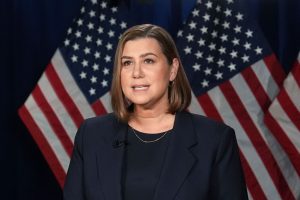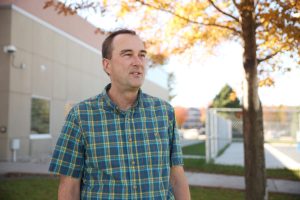
U.S. Rep. Dusty Johnson, R-South Dakota, announces his 2026 campaign for governor during an event on June 30, 2025, at the David Lust Accelerator Building in Rapid City. (Seth Tupper/South Dakota Searchlight)
U.S. Rep. Dusty Johnson’s entry into the 2026 race for South Dakota governor launches him into a Republican primary in which a competitor is making allegiance to President Donald Trump a main issue.
Johnson announced his candidacy Monday with a pledge to focus on “addition and multiplication” rather than division and anger. That same day, a political action committee issued a statement accusing Johnson of being insufficiently loyal to Trump.
“Dusty Johnson is South Dakota’s Never-Trumper-In-Chief,” said Drew Dennert, chairman of Dakota First Action.

The group was founded by Toby Doeden, an Aberdeen businessman who announced his candidacy for the Republican nomination for governor in May. On Tuesday, some South Dakotans received a large postcard from Doeden’s campaign featuring a photo of a bloody Trump after an assassination attempt, with the headine “Will you answer President Trump’s call?”
The other declared Republican candidate for governor is the speaker of the state House of Representatives, Jon Hansen, who announced in April. Republican Gov. Larry Rhoden — who is serving the remainder of Kristi Noem’s term after she resigned for a post in the Trump administration — has not announced whether he’s running.
Johnson said accusations that he’s not supportive of Trump “are not criticisms I generally hear these days.”
“We’re in a political environment where people love to level accusations. And the reality is, I kind of reject the labels,” Johnson said. “I’m just a conservative who’s trying to get things done. And clearly, that means working with President Trump, and we’ve got a great working relationship. He’s had me down in Mar-a-Lago. He’s had me at the Super Bowl. We talk regularly about policy.”
Johnson, 48, is a married father of three from Mitchell who is currently serving his fourth term as South Dakota’s lone member of the U.S. House of Representatives.
The following conversation with Johnson has been edited for length and clarity.
Why do you want to be South Dakota’s governor instead of its congressman?
I love the state. I think the next 20 years for South Dakota could be the best in our history, but I don’t think that’s a sure thing. I think to realize that future, we need a real plan. I think we need real leadership, and I’m excited to be the person who pulls together that plan and pulls together that team.
In many respects, I think the challenges facing South Dakota right now are the right fit for my skill set.
Some Republicans claim you are not a “real” conservative. How will you address that?
The proof is in the pudding. Ultimately, the Republican voters get a say. The Republican voters like the job I do, they understand the conservative and pragmatic worldview that I bring to my work, and they like it.
You voted to certify the 2020 election and voted against Trump’s border wall emergency declaration during his first term. How will you address accusations that you don’t support the president?
Those are not criticisms I generally hear these days. I mean, I think if you were to ask Chat GPT to gather up all of the political articles of the last two years, I think one narrative would be that Dusty Johnson is just too close to Donald Trump.
I don’t try to be any particular type of Republican. I just try to be a conservative who gets things done.
The whole label conversation is kind of ridiculous. It maybe tells you what a dysfunctional age we’re in that I can be an architect of some of the major successes of the House in the last seven months — securing the border, cutting spending and reforming welfare — and somehow, for some people, that’s not enough.
Trump’s cuts to the federal government have resulted in South Dakota’s state government losing $24 million thus far, according to the state Bureau of Finance and Management. You’ve been generally supportive of those cuts. How would you address that lost funding as governor?
Anytime the federal government cuts anything, there is a narrative that the sky is falling. And clearly, some of these cuts are uncomfortable, and I don’t want to be cavalier about them. I mean, these are real programs that matter. And yet, $24 million out of a $7 billion state budget is about one-third of 1% of the state budget.
South Dakotans are resilient enough. We’re resourceful enough to be able to tighten our belt and still get the important things done, even in the face of a federal government that absolutely must move toward fiscal responsibility.
I’m proud of those fiscally responsible votes that I’ve taken. I know they’re not always easy, but if we don’t take care of business, our country will go bankrupt.
Don’t miss any 2026 campaign news: Sign up for our free newsletter.
What areas of state government would you first look at when considering cuts?
Number one, we do need to cut property taxes. And unlike some, I think we need to do it in a responsible way that protects those core services and roads, bridges, cops and schools.
Number two, we need to make college and technical school more affordable. And we need to double down on the programs and the research that really moves South Dakota forward.
In K-12, we need to be relentless about student achievement. We are not talking enough about student achievement. We need to set real goals, we need to use real data. We can’t be afraid to lead.
We need to focus more on drugs and addiction if we want safer communities. We need new interdiction teams, and we need smarter training and treatment within the walls of our prisons.
And we need to grow this economy so we can keep taxes low. That’s going to come from new small businesses, new energy production, dairy expansion and bringing high-tech jobs home to South Dakota.
How would you go about cutting property taxes?
I think we need to focus our property tax relief on the owner-occupied residential, and really, the farmer-managed ag property.
We have plenty of out-of-staters who own plenty of property in South Dakota, and I’m just not as interested in giving them a tax break.
Several failed bills last legislative session in Pierre aimed to create some form of school vouchers using public funds to support non-public educational options. Would you support legislation to establish a voucher program?
I’m a big supporter of educational choice and properly funding our public schools.
I’ve got three sons who are products of public schools, and our Mitchell schools have done an incredible job with my boys.
We’re very involved parents. We spend a lot of time focusing on what they’re learning. And I think the quality of the education is excellent. And I think, as long as we are properly funding our public school systems, then I think we’re allowed the flexibility to ask if there are other educational opportunities that we can invest in as well.
Last legislative session, lawmakers passed and Gov. Larry Rhoden signed a bill banning eminent domain — a legal process for obtaining land access — for carbon dioxide pipelines. As governor, how would you have navigated that?
It’s not my interest in re-litigating every decision that the last administration has done. Fundamentally, this has got to be a forward-looking campaign. And so I just don’t know that there’s any benefit in me being critical of anything that Governor Rhoden has done.
South Dakota has long struggled with workforce shortages in health care and child care. How would you address these chronic issues?
First off, let’s put this into context: This is not a South Dakota problem. It’s a problem in South Dakota, but it’s a problem everywhere. Literally, every one of the 50 states has chronic and severe workforce shortages in child care and health care.
So, I think we need to be honest with ourselves that this is going to take a multi-year, focused effort to solve. This is, in part, closing the skills gap. I think we need to identify people who can go into those fields and do a better job of getting them the education they need.
There is no silver bullet. It will be 100 solutions that address this problem, not one big one.
President Trump has deployed military forces on U.S. soil during protests without state consent, attempted to redefine birthright citizenship by executive order, fired independent inspectors general, deported people allegedly without due process, threatened to annex Canada and Greenland, and intimidated dissenting media. What do you say to protesters in South Dakota worried that America is moving toward authoritarianism?
We have to care about the rule of law. And so, what does the rule of law mean? That means that you only get to do those things that are lawful exercises of power.
Here’s what we know: The federal judiciary has said that the way the president handled the birthright citizenship case is permissible for now; they have said that his use of the National Guard is permissible for now; the firing of independent inspectors general was also permissible.
And so, it’s an interesting allegation for people to say that the president is being an authoritarian when he is following court orders. He has won in these court cases.
I feel like it would be inappropriate for him to ignore a federal court order, but he hasn’t. He’s been winning these things, so it’s an odd accusation for them to make that he’s the one who is violating the rule of law.





